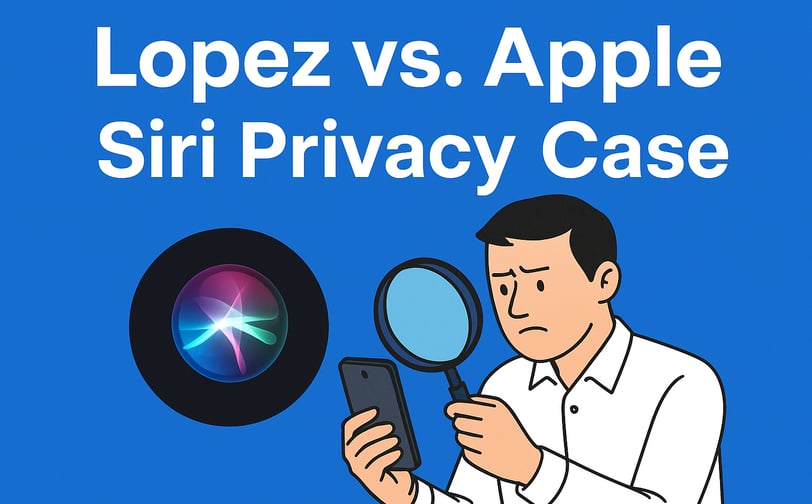Lopez vs. Apple Siri Privacy Case Everything You Need to Know
Let’s dive in to the Lopez vs. Apple Siri privacy case a major lawsuit that revealed how Apple’s voice assistant may have secretly recorded users without their permission. This case raised serious questions about how tech companies collect voice data, how much control we really have over our devices, and what this means for user privacy going forward. In this blog, we’ll break down the key details, Apple’s response, and what this case teaches us about the importance of digital transparency in the age of smart technology.
TECH NEWS & UPDATESGADGET'S


The Lopez vs Apple is a legal case that focuses on privacy concerns for users of how Apple’s Voice assistant also know as Siri recorded users without their permissions, the case was filled back in 2019 in the United States District court for the Northern District of California. It gained questions about how tech companies collect and use the data without our concerns on our smartphones.
Why Was The Case Been Filed?
The lawsuit was started by Apple users who are using the company devices including iPhone, MacBook and Tablets who claimed that sometimes Siri turn on by mistake and record their conversations, Normally Siri activate on the user “Hey Siri” command. However, the plaintiffs said that Siri often activated without their command and listen to their conversations.
According to lawsuit these recordings were stored in Apple server and then study to make Siri better, In addition to that these conversations was study by human contractors to improve Siri’s quality, However users confirmed that they did not give permission to record there conversation whenever Siri wants and they were not properly informed by these practices, As a result plaintiffs said Apple violated privacy laws, Such as the Wiretape act and California privacy regulations.
What Did the Plaintiffs Want?
The lead plaintiff along with others, filed lawsuit as a class action meaning it represented a large group of peoples who are affected by this act and the planintiffs wants from Apple:
· Stop recording users without consent
· Delete any recordings collected without permission
· Compensate users for violating their privacy
They argued that Apple records sensitive information such as private conversations between partners, financial loss, medical discussion etc. and it was picked by Siri, and it records them without their knowledge, it is more like a invincible third person and they don’t know about it.
What Did the Apple Says?
Apple responded by denying the allegations saying that their top priority is privacy and that Siri is designed to protect user information. But on the other hand, Apple admitted that some of portion of Siri interaction was study and this was done annonymosuly and only to improve voice assitant’s quality. After saying this Apple received severe blacklash from the people, hence they gave users to have a option to opt out from the review process and change it’s privacy settings to give people more control.
Why is this Case Important?
The Lopez and Apple case is important because it shows how smart technologies like voice assistants can violate our privacy concerns. Many people don’t take it seriously that these devices like Siri, Alexa and Google Assistant may be sometimes listen to our conversations when they suppose not to. This lawsuit push tech companies to be more transparent, improve privacy settings and respect user constent.
It also rasies concern that these companies control our smartphones when ever they want, though we bought them with our own money,If they can access our microphones so that they can access our cameras. I would recommend to protect your webcam on laptops as well as on mobile phone camera you should buy some privacy webcam cover slider which helps you to stay safe when you are not using the camera.
At last the technology that make our life better and easier it is also comes up with some responsiblites. Companies have to deal with the private data carefully, and users should understand how their devices work.
